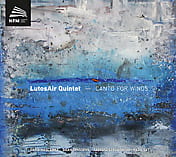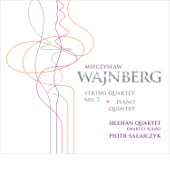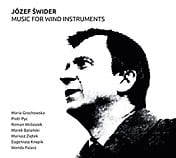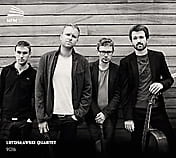Lutosławski Quartet
Marcin Markowicz: String Quartet No. 4. Andrzej Kwieciński: [P|PE(s)]. Paweł Mykietyn: String Quartet No. 3.
Lutosławski Quartet: Bartosz Woroch – violin, Marcin Markowicz – violin, Artur Rozmysłowicz – viola, Maciej Młodawski – cello.
ACD 233
From the CD Accord web site:
The idea of an album featuring works written specially to the Lutosławski Quartet is strictly connected with the celebrations of the European Capital of Culture Wroclaw 2016. The release includes a CD album and a DVD.
2017 marks the 10th anniversary of the Lutosławski Quartet. This release is a kind of summary of the decade of the Wroclaw-based quartet’s activities. Over the 10 year, the quartet has presented mainly Polish chamber music on almost every continent.
The Lutosławski Quartet musicians collaborate with young Polish composers – this has led naturally to new works being commissioned dedicated to this ensemble. Each composer featured on the disc is closely connected to LQ: Andrzej Kwiecinski (his works were played by LQ musicians even before LQ was founded), Pawel Mykietyn (his String Quartet No. 2 has been included in LQ’s concert programmes in Poland, Asia and North and South Americas), Marcin Markowicz (founder and 2nd violinist of LQ, whose previous String Quartet No. 3 was one of the most frequently played pieces in LQ programmes).
 LutosAir Quintet
LutosAir Quintet
David Maslanka: Quintet for Winds No. 2. Daan Janssens: Canto 6. Tadeusz Szeligowski: Quintet for Wind Instruments. Fazil Say: Alevi Dedeler raki masasinda op. 35.
LutosAir Quintet: Jan Krzeszowiec – flute, Wojciech Merena – oboe, Maciej Dobosz – clarinet, Alicja Kieruzalska – bassoon, Mateusz Feliński – horn.
ACD 234
From the CD Accord web site:
Chamber music is seen as the highest level of initiation into music making, requiring from players both soloist talent and collaborative skills, a similar understanding of music, a creative atmosphere and sometimes even readiness to compromise. Composing for a wind quintet made up of a flute, an oboe, a clarinet, a French horn and a bassoon, because of their heterogeneous tones, diverse playing techniques and specific features of individual instruments, poses a big challenge to composers. Only in the 20th century did the tone colours of wind instruments begin to be seen as hugely inspiring and valuable, which resulted in composers writing more and more works for this line-up. Two works from the past century feature on this LutosAir Quintet album, alongside two works of new music, written in the 21st century. It is worth emphasising that it was the Wrocław-based quintet that performed the Polish premieres of compositions by David Maslanka, Daan Janssens, and Fazil Say.
 Wajnberg
Wajnberg
Mieczysław Wajnberg [1919-1996]: String Quartet No. 7 in C major Op. 59; Piano Quintet in F minor Op. 18.
Silesian Quartet: Szymon Krzeszowiec (1st violin), Arkadiusz Kubica (2nd violin), Łukasz Syrnicki (viola) and Piotr Janosik (cello); Piotr Sałajczyk (piano).
ACD 239
From the CD Accord web site:
The Silesian Quartet’s most recent release under the CD Accord label is the first in the series of Mieczysław Wajnberg’s complete chamber works with string quartet.
The album containing the String Quartet No. 7 in C major Op. 59 and the Piano Quintet in F minor Op. 18 (with pianist Piotr Sałajczyk) inaugurates a 7CD-series which will be completed in 2019 – the year of Wajnberg’s birth centenary.
With this series, the Silesian Quartet pays tribute to this eminent Polish artist, considered as one of the greatest composers of the 20th century. His impressive output of compositions is now being rediscovered and is increasingly winning acclaim among both musicians and audiences worldwide.
 Gems of Eastern Europe
Gems of Eastern Europe
Sergey Prokofiev [1891–1953]: Sonata No. 2 in D major Op. 94 bis for violin and piano. Béla Bartók [1881–1945]: Rhapsody No. 1 for violin and piano. Karol Szymanowski [1882–1937]: Nocturne and Tarantela Op. 28 for violin and piano. Kazimierz Lepianka [1869–1948]: A Dream for violin and piano.
Piotr Tarcholik – violin; Monika Wilińska-Tarcholik – piano.
ACD 229
From the CD Accord web site:
The socio-political situation in Europe in the second half of the 19th and the early 20th centuries facilitated the development of national identities and distinctiveness of individual nations. (…) A significant role in this field fell to music. Historians of music differentiate between two distinct trends; the mainstream current and the peripheral trend (the latter being also labelled ‘national‘), in which the social role of music was fundamental. References to a nation’s past, its heroes, literature, customs, language and folklore resulted in development of national schools (styles) of composition such as: Spanish (Sarasate, Albéniz, Granados), Scandinavian (Gade, Grieg, Sinding, Sibelius), English (Parry, Stanford, Mackenzie), Czech (Smetana, Dvořák), Hungarian (Erkel, Mosonyi), Russian (Glinka, ‘The Mighty Handful’), Polish (Chopin, Moniuszko).
 Józef Świder – Music for Wind Instruments
Józef Świder – Music for Wind Instruments
Józef Świder (1930–2014): Lyrical Miniatures for flute, oboe, clarinet, horn and bassoon (1975); Allegretto for flute and piano (1952); Scherzo for flute and guitar (2007); Andante for oboe and piano (1951); Improvisation for clarinet and piano (1991); Sonata for bassoon and piano (1954); Mini-Quintetto for flute, oboe, clarinet, horn and bassoon (1993/2005).
Maria Grochowska – flute; Piotr Pyc – oboe; Roman Widaszek – clarinet; Marek Barański – bassoon; Mariusz Ziętek – horn; Eugeniusz Knapik – piano; Wanda Palacz – guitar.
ACD 228
From the CD Accord web site:
The graduate of professor Bolesław Woytowicz’s composition class at the State Higher School of Music in Katowice (diploma in 1955) contrary to his friends of his graduating class: Henryk Mikołaj Górecki, Wojciech Kilar or a bit older Witold Szalonek, he never flirted with musical avant-garde – the same he was saved from the difficult return journey ‘towards himself’. A Romantic by nature but with a strong desire of classical order Świder remained faithful to the idiom of musical Neoclassicism with romantic-lyric shade, however which was sometimes the starting point for some outstanding excursions and frequently took a surprising shape. Jolanta Szulakowska-Kulawik in her monography of composer’s artistic output described Świder’s music pointedly as ‘music in waiting for Post modernism’. Just like that: not ‘Postmodern music’ but ‘music in waiting for Post-modernism’. Only today in times of ‘post modernity’ – having the perspective of such penurious ‘achievements’ of the avant-garde Modernist art – we can properly perceive the taste of music created in harmony with ‘being’. This is the outstanding hommage: another generation of Silesian musicians – among them graduates of the already mentioned ‘jolly good fellows’ – presents the collection of chamber music pieces of Józef Świder.
